Waiwai: Water and the Future of Hawai‘i
- About the Book
-
For over a century, business interests and political insiders controlled waters across the Hawaiian Islands to benefit a privileged few at the expense of stream ecology, taro farmers, and our islands’ future sustainability. With the future of Hawai‘i’s precious water resources at a critical stage, this book is a groundbreaking exploration of water in Hawaiʻi that bridges ancestral place-based knowledge with present challenges faced by community members, cultural activists, academics, scientists, and policymakers alike. In Waiwai: Water and the Future of Hawai‘i, Kamanamaikalani Beamer brings together experts from diverse fields to tackle complex issues in water management. Indigenous scholars recount how ancestral abundance revolved around the movement and health of water and articulate how these guiding principles transitioned to exploitation by plantation industrialists after the overthrow of the Hawaiian Kingdom. Legal scholars unpack the web of regulations governing water rights; scientists assess the damage already done to aquifers and ecosystems and suggest ways to improve them. The book also investigates environmental responsibility in the case of the fuel leak from the US Navy’s Red Hill Bulk Fuel Storage Facility, giving county officials and community advocates a chance to uplift the concerns of those most impacted by the devastating tragedy.
While providing readers with critical knowledge of the current status of water, the book’s ultimate goal is to catalyze action. Chapter contributors aim to answer the central question: “What do people need to know about the future of water in Hawaiʻi, and what can they do to enable a better future?” The result is a bold vision for how everyone can work together for the long-term health of these islands we call home. Both accessible and critical, Waiwai sounds an alarm about the precarious state of water in Hawaiʻi. It is an interdisciplinary collaboration that illuminates past mistakes, makes clear present challenges, and equips readers with the knowledge and tools to come together and chart a way forward. With this book as a guide, community members, academics, scientists, policymakers, and aspiring visionaries are invited to redirect the course of water management toward sustainability, ensuring a legacy of abundance for future generations.
- About the Author(s)
-
Kamanamaikalani Beamer, Editor
Kamanamaikalani Beamer is the inaugural Dana Naone Hall Endowed Chair in Hawaiian Studies, Literature, and the Environment at Hawai‘inuiākea School of Hawaiian Knowledge and director of Kamakakūokalani Center for Hawaiian Studies at the University of Hawai‘i at Mānoa. He served two terms on the State of Hawai‘i Commission on Water Resource Management.
Contributors
- Kamanamaikalani Beamer
- Pua Souza
- Kawena Elkington
- Ikaika Lowe
- Kapua Sproat
- Mahina Tuteur
- William Tam
- Thomas W. Giambelluca
- Chip Fletcher
- Wayne Chung Tanaka
- Sharde Freitas
- T. Kaʻeo Duarte
- Ayron Strauch
- O‘ahu Board of Water Supply
- Reviews and Endorsements
-
- Deep wisdom flows through the pages of this timely book. As the authors explore what Hawai‘i can remember and relearn from her own Ancestral Circular Economy, we readers are invited to imagine what we too can learn from Hawai‘i's quest to reconnect with her cycles of life. This is powerful inspiration for regenerative economic futures everywhere.
—Kate Raworth, author of Doughnut Economics - Written in an easy free-flowing style fitting the subject, Waiwai is a source for the next generation to help mālama wai.
—Carol Wilcox, author of Sugar Water - This profound and prophetic book is the definitive treatment of the philosophical, historical, and political dimensions of the future of Hawai‘i! Water, wealth, and the well-being of the precious inhabitants of the islands sit at the center of this monumental text. We ignore its painful truths at our own peril!
—Cornel West
- Deep wisdom flows through the pages of this timely book. As the authors explore what Hawai‘i can remember and relearn from her own Ancestral Circular Economy, we readers are invited to imagine what we too can learn from Hawai‘i's quest to reconnect with her cycles of life. This is powerful inspiration for regenerative economic futures everywhere.





